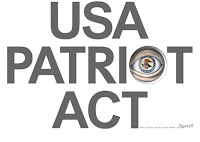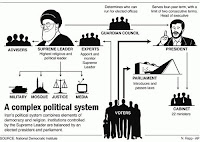Patriot Act Revisited

The US wars across the world will someday come to an end, when the US runs out of money or soldiers or both. But less well understood is the collateral damage in the US where the consequences of the so called global war on terror will linger on in the form of a shattered constitution. The US Patriot Act is generally promoted as the principal legislative tool being used to fight international terrorism. It is, in reality, a devastating and poorly conceived bit of legislation originally approved just after 9/11. It will soon be up for an extension in the US Senate. President Obama, who criticized it while he was a candidate but apparently has had a change of heart since that time, favors its renewal. Most members of Congress, few of whom have ever read the entire act, want it renewed. The mainstream media likes it because who can resist patriotism?
That is the bad news. But there is also some good news. Libertarians, traditional conservatives, progressives, and even some tea partiers are for the first time uniting to stop the extension. Senator Rand Paul led the charge in the Senate back in February, resulting in a temporary 90 day continuation of key provisions of the act that will expire in May. Before that happens, the Patriot Act will again be up for Senatorial approval but this time there will be an open debate in front of the full Senate and under the scrutiny of the media. It will be the first time that has happened since 2001. There will also be a roll call vote with each Senator having to come down for or against. It is an opportunity not to be missed to roll back the tide of government intrusion in the life of every US citizen.
Americans should know what the Patriot Act has done to each and every one of them. Broadly speaking, the Patriot Act was designed to make it easier for law enforcement to investigate US citizens and permanent residents by easing legal restraints on records and activities that were hitherto considered private or required a judge’s order to access. The Act has enjoyed bipartisan support since 2001.
Title 2 of the Patriot Act, entitled “Enhanced Surveillance Procedures,” contains many of its most controversial aspects of the new law. Previously, obtaining information on foreigners residing in the United States was carefully regulated by the “Foreign Intelligence Surveillance Act” (FISA) court and the information generally had to be sought as part of an actual criminal investigation. Under the new law, it became possible to investigate any foreign suspect as part of a law enforcement effort to obtain foreign intelligence information even if there was no evidence that a crime had been committed. The difference is critical as the former procedure required actual evidence of a crime while the new procedure permitted investigation of just about anyone who could plausibly be linked to a foreign suspect to obtain information, allowing law enforcement to conduct wide ranging fishing expeditions. The new rules also lifted the requirement that law enforcement demonstrate that the target of a FISA approved investigation was a foreign national and a possible agent of a foreign government. Anyone linked to the inquiry, including a US citizen, could become a person of interest.
Title 2 also permitted any district court in the United States to issue surveillance orders and search warrants in connection with proposed terrorist investigations and the Act specifically included electronic communications and voicemail records as subject to the warrants. Using the warrants, the FBI is able to access from the internet service provider all records on a user, to include name, address, and telephone billing records, session details, and payment information to include bank and credit card records.
Title 4 and Title 8 of the Patriot Act deal with defining terrorism. The definition was broadened to include many criminal acts hitherto regarded as non-terrorism, to include mass destruction, assassination, kidnapping, intimidation, coercion, and racketeering. It also includes activities “dangerous to human life.” The definition of terrorist support activity was also made extremely broad and elastic, meaning that even a letter to the editor defending a terrorist group or the inadvertent contribution to a charity that was somehow linked to a group that the State Department had defined as terrorist could lead to criminal prosecution. Under the new law, any alien, including legal residents, who is arrested on terrorist related charges can be detained indefinitely under orders from the Attorney General. The evidence used to determine that the accused had possible links to terrorist organizations can be withheld at the discretion of the Justice Department and cannot be challenged, which means that it can be based on suspicion or uncorroborated information. There is no guarantee of any kind of due process for those who are arrested.
Probably most disturbing to libertarians are the National Security Letters (NSL) authorized in Title 5 of the Act. The NSL has been described as an administrative subpoena that can be used by a number of government agencies that have investigative authority. This means in practice that they are mostly used by the FBI. The NSL is used to obtain documents and information relating to any individual or to organizations, to include employment, health, financial, and credit records. There is no requirement for probable cause and there is no judicial oversight of the process. The recipient of the NSL cannot reveal that he has received the letter to anyone and can be prosecuted if he violates that restriction. At FBI, the letters can be issued by any Special Agent in Charge of any field office, which means that the authority to approve a NSL is essentially local, is not reviewed at a higher level, and does not have to be linked to any actual terrorism case. Between 2003 and 2006, the FBI issued 200,000 National Security Letters. As of 2005, the NSLs had been used to obtain more than one million personal records, including medical histories and credit reports. A Justice Department investigation determined that most had nothing to do with terrorism.
It is undeniable that the Patriot Act infringes on constitutional rights to free speech, freedom of association, freedom from illegal search, the right to habeas corpus, prohibition of cruel and unusual punishment, and freedom from the illegal seizure of private property, but defenders of the Acts claim that the infringements are moderate, incremental, and necessary. Defenders of the Constitution would claim that any infringement is illegal and therefore unacceptable. There are also inconsistencies in terms of how the act operates. It is legal under the act to intercept and read an email communication or listen to a phone conversation but illegal to open a letter moving through the United States Postal Service. The part of the act criminalizing giving “expert advice and assistance” to a terrorist group is so broad that it would mean that someone advising the group to surrender to authorities could be arrested. A doctor offering advice on child rearing at an orphanage in Hamas governed Gaza might likewise be prosecuted upon returning to the United States. With the Patriot Act, any objection to Washington’s foreign policy can be construed as an act of terrorism. We have empowered the police to read our private communications, place wiretaps into our homes and places of work, look into our finances and medical histories, and even search our houses without a warrant. Citizens no longer have the right to associate freely and our property can be seized by the government while we are being investigated. The Patriot Act opens the door to fishing expeditions by the government that violate the rights of every American citizen. It is a law that is worthy only of a police state and everyone in the USA who cares about the constitution should unite to demand its repeal. Now …./ excerpts from P.Giraldi



Comments